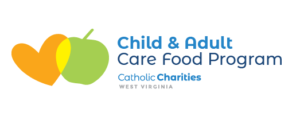
Child & Adult Care Food Program
The Child and Adult Care Food Program is a program to assist in-home childcare providers with serving healthy, fulfilling meals to the children in their care.
The program also educates and assists caregivers in meal planning and application for meal cost reimbursements through the United States Department of Agriculture (USDA) Child and Adult Care Food Program.
Eligibility
- Adults who watch children from the ages of birth-13 in their own home
- Must be licensed by WVDHHR to provide Family Day Care in your home (we can help with this)
- Must agree to follow certain USDA nutritional guidelines
USDA Healthy Meals Guidelines
- Plan, prepare, and serve meals and snacks that meet USDA nutrition guidelines
- Keep daily written or computerized menus of meals and snacks served and children who participate
- Have a minimum of 3 successful visits yearly with your food program monitor
- Attend 3 hours of required CACFP training every year (provided free of charge)
- Keep registration on file active with your local DHHR day care representative

Why Healthy Meals?
West Virginia is continues to rank as one of the nation’s most obese states. To combat this epidemic, we must teach our children to live healthy lifestyles from birth. Providing healthy, nutritious food is part of loving, nurturing and quality in-home child-care.
Catholic Charities West Virginia’s Child and Adult Care Food Program supports in-home child care providers’ choice to serve healthy meals and snacks to the children in their care, thus comforting and assuring parents that their child is receiving comprehensive nurturing care.
The program educates and assists care givers in meal planning and application for meal reimbursements, and is funded by the United States Department of Agriculture’s (USDA) Child and Adult Care Food Program (CACFP), and administered by the West Virginia Department of Education. It is sponsored in all counties in West Virginia by different agencies and is designed to encourage healthy meal choices in homes where child care is occurring.

